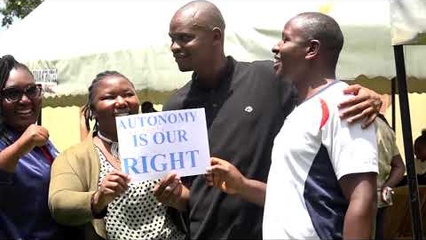By Michael Masinde and Victor Ochieng’
masindemic@gmail.com/vochieng.90@gmail.com
Folk are people in general. A tale is a story or better still an oral narrative. Therefore, a folk tale is a story you narrate to people. This is what grandparents did to us when we were blossoming around the majestic shores of Lake Lolwe and the awe-inspiring slopes of the crying hills.
We sat around the reflective fire places at night after twilight, and savoured the sweetness of scintillating stories that dropped from the lips of the old guards like honeycombs. In most cases, the incisive sessions spilled into the dead of the night. The tales were often deep and didactic in nature. Those are the glad days that the narrator reigned like a king. Lending credible credence to the wise words of Plato, the great Greek philosopher, who succinctly said, “Those who tell stories rule the society.”
That is why we should restore the glamour and glory of storytelling in the society. Folk tales are important genres of folklore. We can achieve a lot through storytelling. Every story always has a teaching value. Public speakers can blend their messages with soothing stories to win heads and hearts of the audiences in equal measure. When you employ a relevant story during speech delivery, you revive the audience. Stories can be anecdotal or experiential. No wonder, Tim O’Brien observed, “My life is storytelling. I believe in stories, in their incredible power to keep people alive, to keep the living alive, and the dead.”
Today, oral literature aspect is largely theoretical. Communities no longer narrate stories, they rarely sing oral songs, and when they do, the young people are not really interested. They no longer use proverbs or set up riddling sessions as our forebears were accustomed to in the years of yore. In these times and climes, learners grapple to express themselves in their mother tongues or father tongues. This is for obvious reasons; learners in classrooms can longer relate with forms of oral literature. It is incumbent upon teachers to be innovative and creative enough in order to pique this interest.
Folk tales also known as oral narratives, are part and parcel of the secondary school curriculum. Teachers of English are expected to teach and examine high school scholars on oral narratives from Form One to Form Four level.
Folk tales can be tested in the oral skills part in English Paper One (101/1) or in question three of Paper Two (101/2) to pay homage to literary appreciation. Oral narratives include legends, myths, trickster narratives, ogre (monster) narratives, spirit tales, human tales, dilemma narratives, parables and etiological stories (explanatory narratives/why stories). There is no specific oral narrative called a fable. A fable is too general a specification. It is important to know that any story which carries a moral lesson and with animals as characters qualifies to be christened a fable.
In question three of English Paper Two, examiners alternate folk tales with a literary/comprehension poem. When folk tales are tested, there are areas that examiners give critical attention. Candidates should know how to classify the narrative and pinpoint the literary styles employed with an explicit explanation of its effectiveness. They should be able to identify and illustrate the common features of an oral narrative which include an opening formula, aspect of timelessness, fantasy, animals as characters, fantasy inter alia. A question on character traits can also surface. The question could be skilfully asked as what we learn about the Hare. Here, the candidate should not give the themes as he will responding to a different question altogether (what do we learn from the Hare). After reading a tale, students should pick moral lessons and identify economic activities, social and political values of the people as well as general comprehension skills.
Based on the recent past trends in the setting and marking of KCSE, the examiners have been alternating Folk tales with Poetry in this question two of English Paper Two. In 2016, it was a poetry question. 2017, it was folk tale. 2018 it was a poem that came. 2019, it was a folk tale, and 2020, it was a poem. Based on predictions anchored on experience, the 2021 class can meet a folk tale in that question. That is why teachers of English should teach this facet in a creative and an in-depth manner. However, this should not mean entirely mean that candidates should sit pretty waiting for an oral narrative because a literary poem or a song can be examined as well on this question. Teachers should let students narrate stories apart from allowing them to listen to audios or watching recorded stories.
The writers are English and Literature enthusiasts. They roll out English Improvement Programmes in Schools.





